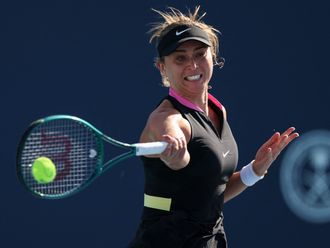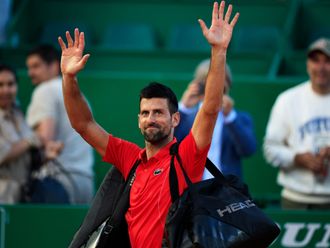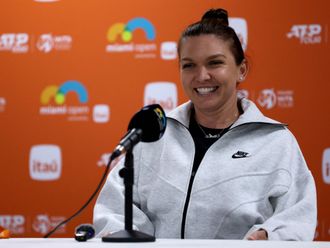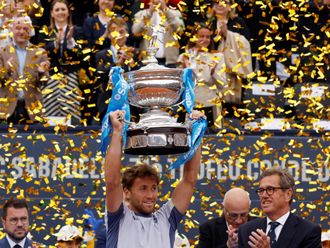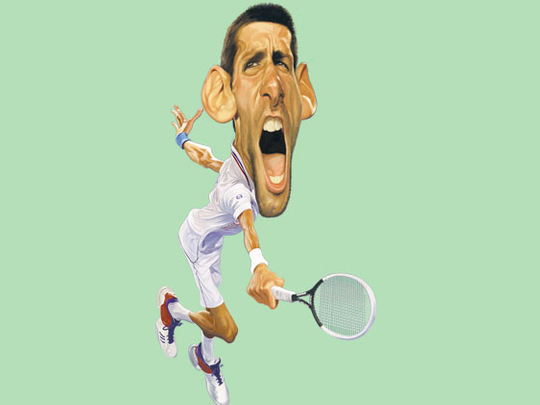
If you ever get a little glimpse into Novak Djokovic's world of wild and implausible possibilities then be prepared to accept that it is resolve and not skill that pushes you ahead; spirit and not serve that eventually propels you to the top of the mountain.
A word of caution: don't dream of climbing that mountain. Give yourself smaller, realistic, short-term goals. The space at the summit is small, it is occupied by Djokovic and he has taken out a long term lease on it.
Despite living in the rarified heights of men's tennis Djokovic is an everyman. He does not live in a parallel universe but in ours. True, not all of us are capable of playing tennis matches for five hours on one day and six hours the next, but the core of Djokovic proves that he is one of us. He makes ordinary people believe that they can do what he has done or, better still, what he plans to do further.
You never get the feeling that he is hallucinating when he puts his life and career in perspective in the dimly lit player's dining room at the Aviation Club. Djokovic has just come off the courts after a successful first round match; given his opponent his due; admitted that his younger brother Marko would have to find a way to step out of the elder's shadow; had a massage; a shower; dinner; some fruit and then proceeds to fold his hands in front of his face, as if in prayer, before stating that the reason for his forceful influence in the world of men's tennis is a combination of hard work and destiny.
Djokovic makes a mockery of the notion that you can't make it on the ATP Tour if you haven't studied the Western grip while your mother was pushing you in the pram, or even prepared to sacrifice your pre-pubescent days trying to get a toehold in the world's top tennis clinics, where swami like teachers espouse every factoid in the game; charge obscene amounts of cash and have pupils holding them in reverential awe.
No. Djokovic and his family stayed indoors instead, at their family home in Serbia, and waited for the Nato jets to finish unloading tonnes of explosives in and around Belgrade during daily sorties — at the height of the conflict in the 1990s. When there was a welcome, but troubled silence outside someone, usually his mother, or father queried, ‘Tennis anyone?" and then they stepped out to practice. They don't teach you that at Harry Hopman, or Nick Bollettieri.
Nothing to lose
How can you win against someone who, after facing this kind of pressure in his formative years, has steeled his mind and body into believing that he has everything to win and nothing to lose. Who believes that his success is pre-ordained?
"I always had the highest goals," said Djokovic, his hands still folded as though he was in confession. "I want to be the best in whatever I do. I wanted to win many Grand Slams, especially Wimbledon which was always in my dreams, and I achieved it in a year's time. So I am grateful for this and I feel blessed that I had the opportunity and grabbed it when it was presented.
"I believe that everything in life happens for a reason," he continued, his eyes focusing sharply, searching for every relevant phrase. "The reason I did what I did in 2011 was written down already by the Almighty, but on the other hand I think that I worked very hard for it. I always believed in what I could do. I always believed in my qualities and when you make the commitments you get the outcome."
Djokovic loves tennis, but just not at the expense of everything else. He can sing you a song on a karaoke machine; he can try and rap like Ice-Cube; he can dance like there's no tomorrow; he can mimic some of his more sober peers on the Tour; he can even say ‘yes' to a movie part, if it is offered to him — like the Expendables 2; and to ensure that there is a certain amount of symmetry in his world he will step out and crush you ruthlessly on the tennis court.
Small wonder that he is the toast of the Tour. The everybodies and even the somebodies who are into public relations; tennis coaching; man-management; mind management; physiotherapy; personal training and financial planning wants to be part of Djokovic's world. But he is content to surround himself with those he loves and those who love him, unconditionally, in return. It is a unique situation for a top sportsman to be in — to be surrounded only by those who love.
There is a reason for this and it makes sense to Djokovic. "I can't speak for the others but I would agree that somehow you expect that with the success you have and the attention that you get, more and more people want to be attached to your success and get benefits from it. I have been fortunate, however, to be surrounded with people I love especially since I began to play tennis.
"In Serbia I nurtured my friendships for a long time because I was aware of the times that would come if I became the best tennis player in the world then I would need their support; that I would need their stability; their advice and their criticism.
"I am happy with the way it is now. These people have been a big part of my success — my family, my friends, my girlfriend and my team. It is important to keep a balance between your personal and professional life. You must build relationships that provide a clear mind before you step on to the courts to do your job."
The stats don't lie. Djokovic has had a pretty good year at the office since 2011. It was a year when his racket acted like a branding iron, burning its mark into the psyche of everyone who came in his way. It seemed like he was in a hurry to play, just like in the days of his childhood when the jets finished their bombing runs and went back to base for a refuelling session, forcing him to come out and whack the ball across the courts in the Partizan Tennis Club in Old Belgrade. Thus began the fashioning of a champion.
Djokovic's tennis isn't the prettiest. He disguises the fact that he has elegance, skill, timing and courtcraft but he demonstrates his strength, pace and a competitive streak — when the strain gets unable to bear, he enforces his will on you.
"I always seek for perfection and improvement," he endorsed. "Even though I am at the peak of my career, I believe that I can improve. That's the beauty of sport. You can always do better. Of course, you have to be satisfied with the results and whatever you have achieved as a professional athlete but you know at the back of your mind that constant improvement is what keeps you going to the practice grounds everyday."
The feverish will to win and a unique fitness regime replaced an earlier conditioning that could at best be termed as spotty. Before 2011, Djokovic was a work in progress this year, however, everyone wants to test his mettle and temperament. Determined to prove that last year was no fluke he is neurotically attentive to detail. "He is like a robot," testified fellow professional Leander Paes, while picking through his plate of fried noodles and salmon, "he is fastidious to detail before and after every match. He has his programmes and goes through it with dedication. I am not surprised at his success."
There are others on the Tour, however, who still believe that when coming face-to-face with him there might be a chance, albeit a small one. Being No 1 means that you are the man to beat, but Djokovic waives aside the fact that he is the ‘hunted one' by providing an argument of his own.
"I don't want to believe that I am the hunted one. I am the hunter," he declared. "That's my attitude: to always be one of the players who is hunting for the trophy. I take every tournament as a new one and I refuse to allow it to be compared to the past ones. That's the mindset that allows me to perform at my best. It allows me to play in the aggressive style that is characteristic of me. This way I never feel the pressure of defending a title."
Being resolute for long periods is not always possible, especially for an ascending star. Djokovic constantly tries to fortify his mind by upgrading it with mental security systems that no opponent can penetrate. He becomes the Tour's definition of Darth Vader revelling in walks on the dark side.
"Professional deformation," he stated laughing at the alteration. "That's what I call it. It's good to be mentally aware and ready for what's going on around you. As I said, a right balance is the formula for my life and me. Being able to perform at my best, understand my commitments, understand the game and the profession, but at the same time stay dedicated, have fun and express my emotions without changing my personality. I have been trying to retain my personality even though I have been monitored from both good and bad angles. I always try to be who I am."
There is evidence of self-absorption, but there is proof of a good logic for that. It lies in Djokovic's competitive streak. He has never hoped for something to happen. Rather, he has believed that it will happen. "Belief is a word that is more common to me," he admitted, "Even more than hope. Because one should always believe in order to realise one's dreams. Believe that anything is possible."
In the top flight world of competitive tennis where every word uttered, every confession made, every advice sought can lead to giving the opponent an advantage Djokovic also comprehends the merits of keeping his own counsel. There is occasional communication and consultation with his peers like Nadal and Federer, but ultimately economy of thought and action rules the day.
"Roger, Rafa and me do talk to each other on issues," maintained Djokovic. "We respect each other a lot, but it's really hard to communicate with somebody who is your biggest rival. I believe that we have a great amount of respect for each other and for what we have achieved. Each of us is modest, self aware and composed and this is good for the sport. It's good to have people who are educated, successful, but modest and well presented in public."
Someone once philosophised that with great power comes great responsibility. Today Serbia rides on the wave of an energy that Djokovic releases across the world as its global ambassador. He is the world's most dominant sportsman and relishes the expectations of his fellow Serbians.
"Look, I think that life is as simple as you accept it to be," he offered. "Sometimes it can be difficult, but there's always a choice of what you want to do, how you want to do it and what you want to be a part of. I have been representing my country for the past couple of years since I have been at the top of men's tennis. I have a lot of young kids who follow me and they are significantly important to me. I always try and dedicate my time to the kids because there are tough times so one must be conscious of imparting the values and opportunities to help children realise their dreams.
"Being an athlete who is an ambassador for his country I carry this responsibility and I must confess that I enjoy it. Not many people can claim that they have their country behind their back and that they can represent it in the best possible way around the world. Everywhere I go the Serbian flag is next to my name. People are interested in my country, that has gone through a lot in the past 20 years: wars, economic crisis, political issues, but it is getting better and you can feel that more and more people are getting interested in Serbia through the medium of sport: tennis, waterpolo, handball, basketball… we have achieved international success. So athletes like me feel an obligation in representing their country everywhere we go. It's a good thing."
A sign of Djokovic's rising equity is visible in tennis courts all over the world — he is bringing in the crowds. It was the same in Dubai where the stands were packed and loyal fans chanted his name as he strode across centre court and thronged for his autograph as he walked out.
Goading him along from one accomplishment to another is his family. The entourage is clearly visible, living and dying with every point he wins, or loses. They have invested much in his success, across multiple platforms, therefore it is fitting that they never miss a moment in the maturing of Novak Djokovic.
"My parents live through the emotions of every point when they watch me play," he admitted. "It's like they are playing themselves! In a way it's normal to expect that because they are parents and we feel their love, their support and their stress as well. It's up to us to adjust and use it in a good way. My parents allowed me to become what I am and realise my dreams."
At some point of time when the pistons pumping his indefatigable engine slow down and the passion in his tennis will have successfully beaten back the spectres of Nadal, Federer and Andy Murray, Djokovic might permit himself the luxury of thinking how important he is in the context of Serbia. He has the power to shape minds, policies and futures?
His answer mirrors his self belief. "Sport has tremendous power, not just in Serbia but across the world. I think that athletes don't even realise the extent of this power and how strong a message they are capable of sending to people. You learn how to believe in what you do; to work towards realizing your dreams; there is no cheating or corruption, and you have to do it all by yourself.
"It's all in your hands, especially if you want to become somebody in this world. So I am aware of the message that sports sends out through the athletes of our small country."
Novak Djokovic is determined to do great things. It is the sole ambition of the everyman. It is evident that despite his chosen profession he will never retreat inside the tennis bubble. Tennis could be the means to an end, but time will tell. His goals will be revised but never forgotten. There is always that never ending upward journey, that feverish necessity to be on top of every project that he sets out to finish.
Sometimes the times pick people out for greatness, but sometimes it's the people who pick the times.


